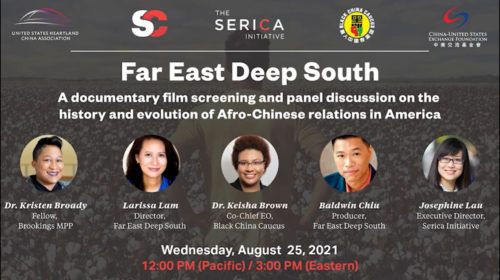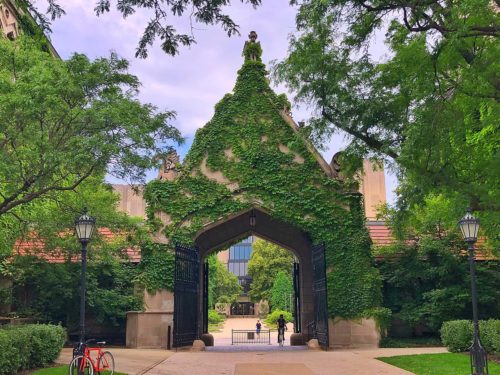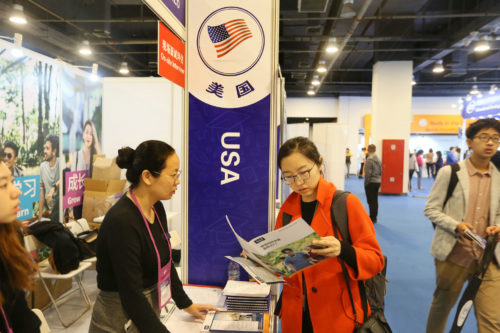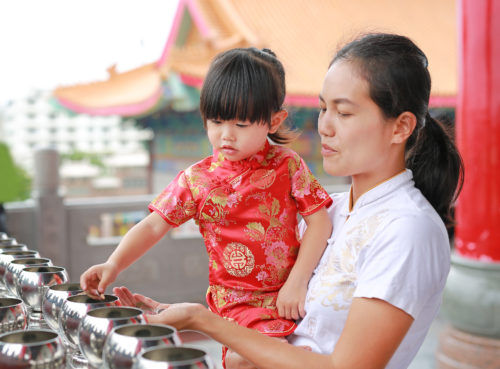The new Yellow Peril?

-
Why we launched a Sinophobia Tracker to follow the treatment of Chinese students and scientists in the United States
-
Resources to understand the issue
Today The China Project is launching the Sinophobia Tracker to provide an ongoing record of prejudicial and inflammatory statements from public figures in the United States and other signs of official targeting of ethnically Chinese people, rather than the Chinese government.
Our creation of a Sinophobia Tracker does not imply that America, and other countries, have nothing to fear from China. Nor does it in any way imply that ethnic Chinese people in the U.S. are a homogeneous group: After all, they comprise Democrat-voting third-generation immigrants, Falun Gong adherents who protest outside Chinese consulates, Trump-supporting new arrivals from mainland China, entrepreneurs who divide their time across the Pacific, exiled dissidents, and hopeful new American citizens just trying to keep their heads down. And yes, there are also plenty of patriotic Chinese who may not have American interests at heart, some spies and agents who may represent real threats to America’s national security, and a bunch of businesspeople and scholars working the system on both sides of the Pacific, who may have overstepped their bounds.
Stanford historian Gordon H. Chang (not the “Coming Collapse of China” Gordon Chang) addresses the diversity of the Chinese community in America in a 2018 paper titled Chinese Americans and China: A Fraught and Complicated Relationship. As he points out, even as “powerful voices in America link Chinese Americans to a putative geo-political China threat… They are deeply divided in their attitudes toward their land of ancestry and the rise of China.” These divisions are likely to grow: “Among Chinese Americans, discord, not unity or agreement, is likely to continue to rise as their political differences over Beijing and Washington sharpen.”
But the rhetoric from Washington, D.C., threatens to elide all those differences, and position ethnically Chinese people in the U.S. as a monolithic threat. This is worrying in a country where many people can’t tell the difference between Muslims and Sikhs, where in living memory, Japanese Americans were put in camps just because of their ethnicity.
Chang’s paper concludes with two questions:
Now dark clouds are gathering and there is little that Chinese Americans will be able to do to clear the horizon. That is the reason for the growing worry within Chinese American communities throughout the country. Will the mounting anti-China sentiment among the American public stoke anti-Chinese fear, including of Chinese Americans? Will they be caught in the middle of global geo-politics?
That paper was published in September 2018. I contacted Professor Chang by email and asked for an update and if he thought the “dark clouds” gathering above the Chinese-American community might disappear once Trump is no longer in office. This was his reply: “Trump intensified the sinophobia, but even without him, it will get worse. I am not optimistic.”
Are Chinese Americans and visiting scholars being unfairly targeted?
I believe the evidence is clear on our Sinophobia Tracker that Gordon H. Chang’s “dark clouds” are, in fact, gathering. But has the storm actually begun?
The United States has a history when it comes to unfairly targeting Chinese scientists. The most famous victim is Wen Ho Lee (李文和 Lǐ Wénhé), a Taiwanese-American scientist who worked on nuclear projects at Los Alamos and was indicted by a federal grand jury in 1999, on completely false charges of stealing secrets about the U.S. nuclear arsenal for Beijing. His name was cleared in 2006 by a civil court action. More recently in 2014, Sherry Chen (陈霞芬 Chén Xiáfēn), a hydrologist working for the National Weather Service, was accused of spying and arrested in October 2014. In March 2015, federal prosecutors dropped all charges against her without explanation, but she lost her job. She’s now taking the U.S. government to court for malicious prosecution and false arrest.
Has it gotten worse for Chinese scientists since 2015? In our Sinophobia Tracker, we identify FBI Director Christopher A. Wray’s testimony before Congress in February 2018, when he called Chinese students and researchers part of a “whole-of-society threat” as the Ur-moment of the current sinophobia. Since then, we note the following cases of case dismissals, or investigations of Chinese scientists where clear wrongdoing has not been established:
- In May, Emory University in Atlanta, Georgia, sacked two neuroscientists, Lǐ Xiǎojiāng 李晓江, and his wife, Lǐ Shìhuá 李世华, after they were accused of failing to “fully disclose foreign sources of research funding and the extent of his work for research institutions and universities in China.” Li’s lab was dismissed and four researchers working for him, who are Chinese nationals, were ordered to leave the U.S. within 30 days after the lab’s closure. The university’s investigation started back in November 2018 and was prompted by orders from the National Institutes of Health (NIH), a U.S. government-affiliated agency responsible for biomedical and public health research.
- Houston-based MD Anderson Cancer Center ousted three Chinese scientists in April due to concerns about their Chinese ties. “When NIH notified MD Anderson of concerns with specific individuals within its institution, the university took immediate steps to remediate the problem,” the NIH said in a statement.
- Last year, the U.S. Department of Commerce was ordered to reinstate Sherry Chen, the Chinese-American hydrologist who was wrongly accused of sharing confidential information about American dams with Chinese officials. The decision came more than three years after the Justice Department dropped espionage-related charges against her.
- Temple University physics professor Xī Xiǎoxīng 郗小星 was arrested in May 2015 after the FBI alleged he intended to share U.S. technology with China, but the charges were later dropped when they were proved false.
- Multiple anecdotes of visa delays and denials from Chinese nationals studying at American high schools and universities.
What are the charges?
There are three main suspicions that seem to be motivating the scrutiny of ethnically Chinese scholars and scientists:
- Espionage: theft of military and industrial secrets.
- Sharing of research information with Chinese institutions.
- Accepting funding for, or affiliation with, Chinese institutions in violation of the conditions of American research grants.
The role of the Communist Party of China
While our launch of a Sinophobia Tracker is clearly motivated by concerns about unfair racial profiling, we would be remiss not to address the issue of the genuine bad actors under orders from Beijing, and bad decisions made in contravention of explicit or implicit agreements with American institutions.
Respected China-watcher Bill Bishop tweeted the following in reaction to the growing scrutiny of Chinese scientists:
Spouse has a cousin from P.R.C. who became U.S. citizen a few years ago. They are a scientist who recently left the U.S. to teach at a Canadian university. Previously they worked in the U.S. national laboratory system. Their view on “profiling” of ethnic Chinese scientists interesting: “Probably 80 percent are guilty”, says they used to report the ones double dipping on 1000 Talents and other P.R.C. programs when at the U.S. National Lab, knows of so many cases where scientists are violating their contracts and are so “unethical.”
Says big issue is that for too long the U.S. never enforced the laws, and now that they are, people are scared and squealing because so many got away with bad behavior for so long.
The Chinese-American journalist Gerry Shih replied:
Have lots of STEM relatives, family friends and this +100. Silent minority (sadly) of Chinese Americans absolutely ashamed by degree of pilfering they see around them from a country “that’s given us so much.”
The head of extra-mural research at the NIH, which is behind some of the investigations mentioned above, concurred in an interview with Science magazine: “This is not subtle. It’s not an, ‘Oops, I forgot to list it on a form.’ We’re talking about really, really egregious stuff.”
One other factor is sometimes missing from the debate: the role played by the Communist Party of China, and its many organs of influence. The China Project’s science columnist, Yangyang Cheng, who lives and works in the U.S., told me that she is cautious about using the term “racial profiling” because it “often misses the premise that it is the Chinese government that has initiated such targeted political overreach and overseas influence campaigns into the Chinese diaspora, not the least of which the 2017 National Intelligence Law, so there is a certain order and causality of events.”
The 2017 National Intelligence Law, per Quartz, “gives intelligence agencies legal ground to carry out their work both in and outside China.” It’s also worth noting that a key aim of the Communist Party’s United Front Work is to unite overseas Chinese communities behind Beijing, or at least make them seem united. This directly affects how all ethnically Chinese people are perceived around the world, and the blame lies squarely with Beijing.
‘This isn’t black and white.’
Frank Wu, president of the Committee of 100, an advocacy group for Chinese Americans that has campaigned against unfair profiling of Chinese scientists, says the issue “isn’t black and white.” He explained, in an email to The China Project:
The reality is there are three categories of cases.
First, there are real, straight-up instances of wrongdoing, either real espionage or economic espionage or theft of trade secrets.
Second, there are false positives, people accused of terrible crimes who in fact are innocent but caught up in the panic and stereotyping, which blend together to make normal activities seem as if they were sinister cloak and dagger machinations.
But third and finally is a troubling category of people caught by changing norms: activities that were encouraged a decade ago and accepted a year ago are not deemed prohibited and a cause of suspicion — there are new policies and ramped-up enforcement.
The change in atmosphere in the U.S. has been so fast, and the Trump administration so untransparent and chaotic, that a major source of unease has been the lack of clarity and transparency. We hope that our Sinophobia Tracker and the links and resources listed below will help to put some sunlight on what the U.S. government is doing, and gauge the level of danger posed by inflammatory rhetoric, while at the same time, illuminating malignant behavior from Beijing that poses a threat to America and the Chinese people who live here.
Links and resources
Universities raising concern
Since the beginning of 2019, at least a dozen major American research universities have put out statements specifically voicing support for Chinese students and scholars, who have widely reported encountering visa difficulties and feeling heightened suspicion from the U.S. government:
- UC Berkeley: Reaffirming our support for Berkeley’s international community / February 21, 2019
- University of Michigan: Statement at Regents Meeting on U.S.-China research collaborations | Office of the President / March 28, 2019
- UC Davis: Reaffirming Commitment to Our International Community / April 22, 2019
- University of Delaware: Our Commitment to International Scholarship / May 10, 2019
- Rice University: Message from President David Leebron to the Rice Community / May 17, 2019
- Yale: Yale’s steadfast commitment to our international students and scholars / May 23, 2019
- University of Maryland: UMD’s commitment to international collaborations and the international community on campus / May 30, 2019
- UChicago: Citing U.S.–China Tensions, Zimmer Affirms Commitment to International Students / June 10, 2019
- Syracuse: Statement from Senior Vice President for Enrollment and the Student Experience Dolan Evanovich Reaffirming University’s Commitment to International Community / June 17, 2019
- Washington University in St. Louis: Reaffirming the intrinsic value of our international community / June 24, 2019
- MIT: Letter to the MIT community: Immigration is a kind of oxygen / June 25, 2019
- Columbia: A Letter to the Columbia Engineering Community / undated
Several other universities have put out statements not mentioning China, but fairly obviously with U.S.-China tensions in mind, voicing support for the international community on campus:
- Stanford: In support of our community – Notes from the Quad / March 7, 2019
- Case Western University: A statement by the President and Provost / June 11, 2019
- UCSD: Reaffirming Our Support for UC San Diego’s International Community / June 13, 2019
Two universities based in California, Stanford University and UC Davis, echoed UC Berkeley’s warning that the state’s history shows “an automatic suspicion of people based on their national origin can lead to terrible injustices.”
More reading and references
The enigma of Trump’s mind
- ‘We want more Chinese students’: Donald Trump says US looking for new ways to keep scholars in the country / SCMP
On June 29, 2019, “Trump said his administration wants a ‘smart person’s waiver’ to allow successful overseas university students to remain in the US more easily after graduation”
- ‘Politico’ reports that Trump called most Chinese students in the U.S. spies / Inside HigherEd
From August 2018: “President Trump characterized the vast majority of Chinese students in the U.S. as spies during a dinner Tuesday night with CEOs at his private golf club in New Jersey, according to a report in Politico.”
Reports of purges of Chinese scientists and scholars
- Universities worry about potential loss of Chinese students / The Washington Post
“China’s warning Monday about the ‘risks’ to students of coming to the United States could pose a major challenge for U.S. higher education because China is the largest source of international enrollment for America’s colleges and universities.”
- The U.S. is purging Chinese cancer researchers from top institutions / Bloomberg (porous paywall)
“Everything is commodified in the economic cold war with China, including the struggle to find a cure for cancer.”
- U.S. government profiling ethnic Chinese scientists / Committee of Concerned Scientists
- US-China tensions leave some researchers on edge / The Scientist Magazine
- Chinese American scientists uneasy amid crackdown on foreign influence / Nature
“Some fear the rising tensions could lead to an exodus of researchers with Chinese backgrounds from US institutions.”
- America’s new — and senseless — Red Scare / by John Pomfret in Washington Post
“In their eagerness to stem significant intelligence losses to Chinese spies, law enforcement officials in the United States are frantically prosecuting Chinese scientists, and again making a gift to China of ‘trained technicians, steeped in American know-how.’”
- Targeting Chinese students and entrepreneurs in the U.S. is the wrong way to battle Beijing / by Dominic Ng in LA times
“Stoking racial divides is exactly the wrong way to fight the problem.”
- US medical school Johns Hopkins bars foreign scientists over intellectual property risk / SCMP
“The Johns Hopkins University School of Medicine has halted a visiting scientist programme in response to a national investigation over whether scientists in the US are sharing research results with foreign governments, in particular China, the South China Morning Post has learned.”
Historical cases
- Statement by judge in Los Alamos case, with apology for abuse of power / NYT (porous paywall)
- Was Lee indicted, and not Deutch? / LA Times
- Why Vincent Chin matters / NYT (porous paywall)
“On June 23, 1982, in Detroit, a young man named Vincent Chin died. Four nights earlier, he had been enjoying his bachelor party with friends at a local bar when they were accosted by two white men, who blamed them for the success of Japan’s auto industry. ” - Thread of the silkworm / Foreign Affairs
Videos:
- U.S. fight against Chinese espionage ensnares innocent Americans / CBS News
- Collateral damage / CBS News
Op-eds by Frank Wu:
- Why Asian Americans don’t attract sympathy / HuffPost
- Help us: Asian Americans under attack / HuffPost
- A private note to Chinese immigrants / HuffPost
- Where I am really from / HuffPost
- The lessons of the internment / HuffPost
- Our changing consensus about the internment / HuffPost
- Arguing about the internment — and much else / HuffPost
- Other internments / HuffPost
- How we talk about exclusion and internment / HuffPost
- Teaching the internment to those who would resist / HuffPost
- There are no Asians in Asia / HuffPost
- My mistake on Proposition 187 / HuffPost
- The power of perceptions: how the Chinese see America, and how Americans see China / HuffPost






